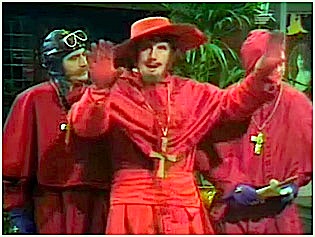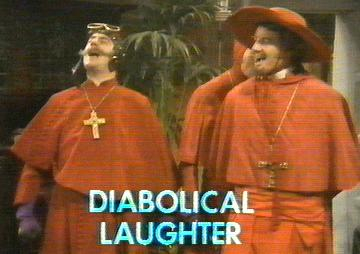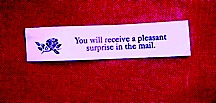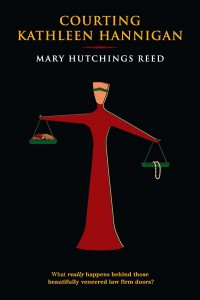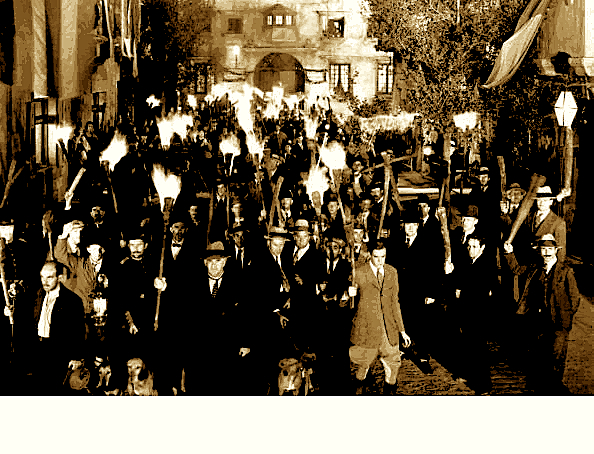
Yes, yes, I know: I thought we were done with this topic for the nonce, too. Yet just when I thought I’d said all I had to say on the all-too-seldom-discussed issue of passive protagonists, life once again intervened to provide me with a perfectly dandy example of how inactive and/or endlessly self-pitying characters can frustrate a reader.
Or in this case, viewer. For the past few months, my fiancé has developed a positive passion for toting home DVDs containing entire seasons of TV series and insisting that we watch them. This would be a trifle less odd if I habitually watched of my own accord anything except news, comedy news shows, and Project Runway (I admit it: I like a nice gown), but as anyone who has navigated a long-term relationship could probably tell you, compromise is the key to happy cohabitation. (That, and negotiating very, very clear rules about who does what housekeeping chore.) As day-to-day trade-offs go, my spending a few weekends locked up with whatever horde of mostly unsavory characters he might have happened to stumble upon at the video store while he brings snacks to my writing studio during the week isn’t bad at all.
I was very patient with the first season of the most recent show, I really was. Which says something for my general level of tolerance, given that Rick had decided he wanted to watch it based upon a recommendation from a friend of his who…well, let’s just say that at the Halloween party where I first met him, the friend stormed up to argue with me about what he considered the disturbing political implications of my costume.
In case you were wondering, I was dressed as a suffragette, wearing a banner that read VOTES FOR WOMEN. So I wasn’t precisely expecting very robust female characters in a show he strongly recommended, if you catch my drift.
Actually, since we were watching the first season during my passive protagonist series, I should have been grateful. Breaking Bad‘s protagonist, Walt, vacillates between feeling sorry for himself more or less constantly and trying to remedy his situation by making and selling drugs. Not that he isn’t entitled to a spot of self-pity: the show’s creators have loaded poor Walt with a plethora of problems that would have made Job turn pale: he is battling probably terminal cancer, his teenage son walks with crutches, and as the show opens, he and his wife are expecting an unplanned-for child.
Which is a strategy straight out of the make-your-protagonist-more-likable playbook, right? The more significant the barriers are to the protagonist’s achieving his goal, the more likely the reader is to root for him while he is pursuing it.
Normally, It’s also not a bad technique for rendering a protagonist more active — and to be fair, the vast majority of Walt’s plot-altering behavior in the first season did in fact come in direct response to his confluence of dreadful luck. However (and my apologies to both those of you who may love this series and those who are planning to view it anytime soon; the latter may wish to stop reading at this juncture), this potentially engaging premise also contains a plot conceit that virtually guarantees that most of the other characters in the piece will be primarily reactive: like a million other strong, silent men in a thousand other films and TV shows, Walt doesn’t like to share his problems with anyone he loves. Or anyone else, that matter.
Among the simply enormous problems he spends the first season not telling his wife or any members of his immediate family: his diagnosis and the fact that he’s started dealing drugs to make money to care for all of them after he’s gone (although his logic on this point remains a trifle fuzzy until well into season 2).
Sound familiar? It should: the Problem I Can’t Tell Anyone About (TPICTAA, for our purposes today) is an extremely common plot device. Essentially, it’s a means of increasing the difficulty of the barriers the protagonist must overcome; by definition, he cannot rely upon his ordinary support system, because then they’d know. Admittedly, it’s often a trifle mechanical in action, producing rather predictable plot twists — oh, if my parents find out that I’m secretly training for the Olympics before I win the gold medal, all will be lost…but wait, who is that in the reviewing stands, cheering me on? — but handled well, TPICTAA can be a very effective means of raising the stakes for the protagonist, creating additional sources of conflict, building suspense, increasing plot tension, etc.
The trouble is, at this point in dramatic and literary history, most audience members are already pretty familiar with the standard twists provided by this particular plot device; as a result, it’s awfully easy for a TPICTAA-wielding writer to tumble headlong into cliché territory. Seriously, when’s the last time you saw a protagonist’s belief that his loved ones wouldn’t understand his dilemma or what he felt he needed to do to solve it justified by a story’s denouement? How often does the wife/husband/sweetheart/mother/father/grandparent/child/best friend/dog not shake her/his/its furry head ruefully upon learning the PERFECTLY TREMENDOUS SECRET, simultaneously holding back tears and chuckling, and demand, “Why didn’t you tell me? Don’t you know that I love you, honey/Mom/Dad/Grandpa/Muffin/Bud/woof?”
Okay, so the dog really knew all along. No real suspense there; Fido’s the forgiving type.
Unfortunately, because this plot device is in such wide use, particularly in movies and TV shows, it’s become significantly less effective as a suspense-building technique. Think about it: if the reader already knows that revelation and reconciliation is the inevitable conclusion of all of the protagonist’s frantic secret-keeping, it can be hard to maintain — or even enlist — the reader’s sympathy. Particularly, as often happens, if the 90% of the central problem of the book could be solved if the protagonist simply walked up to the person he most fears will discover his secret and blurts it out in Chapter 2.
Instead of making precisely the same revelation in Chapter 26 of a 27-chapter book.
This is why, in case you’d been wondering, strong, silent men (or women, for that matter) so often make passive protagonists: the vast majority of their energies are going toward keeping that PERFECTLY TREMENDOUS SECRET the reader’s heard about in Chapter Three, but figures the SSM isn’t going to reveal formally until the aforementioned Chapter 26. A popular variation on this plotline, especially those featuring Protagonists With a Past: the reader doesn’t find out the content of the secret until Chapter 26, either.
Is that glint in the noonday sun an indication that some of you SSM-lovers out there are quick on the draw? “But Anne, I’ve read/seen plenty of stories with SSM protagonists, and they’re positively stuffed to the gills with action. Why, SSMs are constantly shooting back at bad guys, rescuing damsels and children in distress, and combing nighttime cityscapes to clear their good names!”
You’re quite right, pardners — an active SSM or SSW protagonist does indeed frequently perform many of these feats. But again, the writing challenge is to show him or her continually being active in pursuit of all of that name-clearing in a way that will genuinely surprise the reader: can you honestly say that it’s a great big surprise, for instance, when the protagonist first confronts the villain who smeared his good name — and the villain just laughs? Or when the SSM and the guy who slaughtered the SSM’s family as far as it can be traced have a showdown at the end of the story — and the SSM wins?
Predictability is, after all, the universal solvent of suspense. And let’s face it, not all SSMs or SSWs spring into action the nanosecond their good names are besmirched.
In fact, the primarily passive SSM or SSW’s reaction is the more common in manuscript submissions: yes, SS+ (I got tired of typing all of the ors) will rumble into movement occasionally, but usually, someone else instigates it. The bad guy butchers the SS+’s loved ones, so the retired gunman comes out of hiding — reluctantly, always reluctantly. Or the SS+ knows that an angry mob with pitchforks is coming to get her and that adorable moppet of a 9-year-old she’s picked up along the way (dare we hope that the child’s winning ways have melted the SS+’s notoriously inflammable heart?), so she holes up in the cabin where EVERYONE CONCERNED KNOWS SHE LIVES, waiting with bated breath for the mob to arrive and set fire to it. Or, most popular of all, the SS+ has very good reason to believe that conflict is inevitable, but instead of heading out to meet it, has a really long talk about it with his/her best friend — or him/herself.
I see those six-shooters waving in my general direction again. “Okay, Anne, I can see how other characters might be moving the plot along more than the SS+ — but is that potentially problematic? As long as there is conflict on every page, or at any rate in every scene, why does it matter if my SS+ is primarily reactive between Chapters 3 and 26? I’ve read many great books where the protagonist was buffeted about by forces beyond his control.”
As have I, of course, but as we’ve discussed many, many times in this forum, what will work for readers who pick up a book in a bookstore or library will not necessarily fly in a manuscript submission. Why? Because Millicent the agency screener, like pretty much every professional reader, assesses manuscripts one line at a time, not based upon entire chapters or the whole book.
In other words, her assessment of whether a protagonist is passive or not is not going to be based on the plot as a whole, but rather upon how s/he acts — and reacts — on page 1. Then on page 2. Then in the second scene. And so forth.
Those of you writing about protagonists who start out meek and learn over the course of the story to assert themselves just went pale, didn’t you? I can’t say as I blame you: the meek may well inherit the earth, but they tend to annoy Millicent in the early pages of a manuscript.
To put it a bit more bluntly: if your protagonist’s first plot-altering action doesn’t occur until later in the story, it may not matter for submission purposes.
But as we discussed earlier in this series, this need not mean that the only acceptable protagonist is one who goes through life bullying people. A shy person who struggles desperately against her feelings in order to pursue her heart’s desire can be a very active protagonist indeed. So can a depressed character fighting to regain interest in the world around him, or a basically peaceful person who has tried everything in his power to resist that bad guy before forcing a showdown with him in Chapter 26.
Okay, I’ll be blunt again: is it really the best strategy to have that gunfight at high noon be the first time in the book the SSM stands up for himself? And if your answer to that was a resounding yes, could the protagonist be fighting other forces or problems throughout the 23 chapters where he’s working up his nerve for that showdown?
Yes, there should be conflict on every page, but it needn’t always be the same conflict, need it?
The same basic principle applies, naturally, to TPICTAA-driven plots. All too often, a passive protagonist’s primary (or even only) motivation for action is keeping that PERFECTLY TREMENDOUS SECRET, well, secret. No matter how strong that impulse to prevent any possibility of the most emotionally important characters in the book from experiencing productive conflict on the subject prior to the terminal chapter (oh, dear — was I channeling Millicent again?) shield himself from rejection and/or other consequences may be, it’s awfully hard to keep coming up with new and fascinating evasive tactics for an entire book.
At least ones that don’t make the people from whom he’s trying to keep the PERFECTLY TREMENDOUS SECRET come across as dim-witted. Like any single-problem plot, TPICTAAs often run the risk of becoming one-note.
Seriously, the parents saw their physically slight son disappear for weeks at a time, returning with a physique that would have made Hercules sob with envy, and they had no idea that he might be engaging in some sort of training? Really? The incident when he accidentally ripped the front door off its hinges didn’t give them an inkling?
So how can a writer add more potential for conflict to a TPICTAA storyline? Give that secret-hider a disparate array of problems. After all, it’s a rare real-life person who faces only one difficulty in life, and the more different kinds of barrier the protagonist must struggle against, the wider the range of possibilities for interesting conflict.
You can also give the characters trying to figure out the protagonist’s secret — they’re not just sitting around passively, waiting for her to reveal it, are they? — more clues. I’m not necessarily talking about merely the antagonists here; consider the dramatic possibilities of one of the protagonist’s allies launching an independent secret-ferreting mission. Try giving that character more incentive to figure out what’s really going on. Or just plain make her smarter.
Specialized knowledge is always a nice, complication-generating touch. Who would be more difficult for our Olympic hopeful to fool, parents who never tear their eyes away from their computer or TV screens, or a mother who took the bronze in the shot put in 1976 and a father who lost an eye in that ill-fated world fencing championship in 1979?
While you’re going though your secondary characters, trying to decide which to beef up — look at me, already blithely assuming that you’re going to take that VERY GOOD piece of revision advice — start with the ones who don’t have strong, well-defined personal goals independent of the protagonist’s. The protagonist’s love object or best friend, for instance, often is saddled with nebulous desires like wanting the best for our family, just trying to be a team player, or even the dreaded I only want to see you happy.
Not that these aren’t perfectly lovely and plausible explanations — they are. However, allies motivated solely by their concern for the protagonist (or anybody else, for that matter) tend to give the protagonist an easier time of it than characters who have their own agendas. Particularly if those agendas are somehow at odds with the protagonist’s, knowingly or not.
Hey, you try making life plans while your wife/husband/sweetheart/mother/father/grandparent/child/best friend/dog is harboring a PERFECTLY TREMENDOUS SECRET from you. How are you to know that your dream of becoming the world’s first water-skiing lion tamer would throw obstacles in the way of your loved one’s hidden goal of moving to the middle of the Mojave desert to raise lop-eared bunnies?
The complication-generating part of your brain has already begun whirring, hasn’t it?
As tempting as it might be at this juncture simply to draw up a list of your book’s major characters, assign each a burning secret passion, and let the conflict flow, do bear in mind that any one-note character, protagonist or not, can start to get on Millicent’s nerves after a while. (What was that I mentioned earlier about predictability being the natural enemy of sustained suspense?) A few questions you might productively ask yourself about any character you’re looking to deepen — and all of these are equally fine questions to apply to a protagonist, by the way:
What does this person want most in the world?
What’s preventing her from getting it?
What’s she willing to do in order to get it?
What would she NEVER be willing to do in order to get it? Is there something close to that line that she could do in this story?
What or whom does this person love most?
What does this person fear most?
What’s this person’s good luck charm? What’s her pet superstition?
How does this person want others to view her?
How has this person settled for less than she could have achieved? Could she challenge herself more, and in a way that would make the story richer?
Don’t be afraid to give any character in your book mixed motivations or a lack of certainty about his desires. Real people are a welter of internal contradictions, after all — why not spice things up for your protagonist by having a secondary character act out of character every once in a while?
Oh, you wouldn’t have been surprised if your mild-mannered third-grade teacher had abruptly decided to engage in commando training? (A pursuit that might actually have softened my third-grade teacher’s personality, come to think of it. I still have nightmares about her classroom.)
I’m sensing a bit of restlessness out there, and unless I miss my guess, it’s not entirely the result of trying to picture one’s third-grade teacher leaping out of a helicopter, guns blazing. “Okay, Anne, I can easily see how this would be fantastic advice for a writer just starting a book, or even engaging in a first revision. But I’ve been over my manuscript over and over again; frankly, I’m trying to make it shorter. Won’t all of this complexity-mongering just, you know, add pages?”
Yes, probably, but think about it this way: for every unexpected, complex character-revealing interaction you add, you may well be able to cut a more expected one — or possibly more than one. How many times, for instance, does the reader need to see the protagonist kiss his wife good-bye as she leaves for work? Wouldn’t that nifty new scene where she comes out of their bedroom wearing a gas mask because she’s become obsessed with the idea of carbon monoxide poisoning make a dandy substitute?
Getting the picture? Most Millicents would be far happier reading even an extended scene about the difficulties of kissing someone wearing a gas mask than even a short exchange of predictable pleasantries of the Have a nice day, dear. You, too, honey variety.
Lest those of you writing about ordinary life begin to feel left out, I should hastily add that this sort of revision can be even more effective for your manuscripts than for ones that would happily support wackier plot twists. Real people are pretty interesting, on the whole, particularly once a writer makes a point of examining their hopes, dreams, and fears, rather than defining them primarily by their roles in the protagonist’s life.
Yes, yes, presenting a character AS his role is sometimes unavoidable and even desirable on the page, particularly for characters that are seen once and never turn up again. The ER doctor treating the protagonist’s daughter in Chapter 5, for instance, need not necessarily be fleshed out as a person, in addition to being a medical provider. But trust me, Millicent sees enough purely altruistic doctors, self-sacrificing mothers, emotionally distant fathers, bratty little sisters, sullen teenagers, men who never really grew up, and prim librarians in any given week to populate a small city.
I like to call it Cliché Falls. The fewer of its citizens you recruit to traipse past Millicent’s weary eyes, the happier she will be.
In the course of ramping up the complexity, do try to avoid giving more than one major character a similar problem — or a similar way of dealing with it. If every character in the book responds to imminent conflict by changing the subject, for instance, that’s going to become predictable pretty fast. Ditto if more than one character responds to the challenge of discovering the TPICTAA by getting upset with the protagonist for not spilling the beans.
I know: people do tend to respond this way in real life. But the goal here is not merely to hold the mirror up to nature, but to tell an entertaining story, right?
Let Millicent answer that one for you: “Great heavens, yes!”
Which brings me back to why I’ve summarily banned Breaking Bad from our household, even at the cost of foregoing warm baked goods, fruit, and tea appearing on my writing desk at gratifying intervals throughout my work day. A few episodes into the second season, I abruptly transformed into Millicent in the middle of a scene where the protagonist was actually being pretty active.
And let me tell you, donning the Millicent mask is seldom pretty. “I’m done with this series,” I snapped, shutting off the DVD player while the protagonist was in mid-sentence. “I could take the mostly passive protagonist, his purely reactive wife, and his completely inarticulate drug-making partner — who are, I should like to point out three of the six main characters in the series. I’ve made a monumental effort not to be annoyed by just how many of the protagonist’s problems would have been solved by a single line of dialogue spoken to the right character. I’ve even been tolerant of the show’s propensity to bolster his Strong, Silent Man credentials by offering him a perfectly plausible way out of his primary dilemma — an escape hatch that he refused because he’s unwilling to accept help from anyone. But in this particular episode, all three of the primary characters are using precisely the same coping mechanism. It’s predictable, it’s boring, and if I could walk into any of these scenes with a megaphone, I could stop 80% of the conflict by speaking less than ten consecutive words!”
I suppose I could have completed the Millicent impression by shouting, “Next!” but that seemed like overkill.
What had the show done to make me stop reading, essentially, in the middle of a line? See if you can detect the subtle repetitive pattern here: the partner gets evicted from his house; rather than telling anyone — like, say, the protagonist — why he needs a place to stay and/or money to pay for a place to stay, he keeps it to himself, only to end up surprised and frustrated when no one in his life takes his need seriously. The wife believes that her husband is lying to her, but rather than confront the protagonist about her suspicions, she just starts leaving the house for hours at a time. Even when he confronts her, she simply remains silent, only to end up surprised and frustrated when he doesn’t take her need to know (and her need for him to guess what she thinks she needs to know) seriously. The protagonist then takes his frustration out on the partner, who not unnaturally hits him up for a loan. Because neither party will actually divulge any of the relevant details that would enable the other to understand what each wants, both end up surprised and frustrated that the other does not take his need seriously.
Enough, already. Mutual emotional inarticulateness, desperately kept secrets that ten minutes of investigation would have revealed, and the silent treatment are all too common manuscript features for a professional reader to derive much enjoyment from them in yet another story. Yes, people do indeed engage in all of these behaviors in real life, but if I wanted to spy on real people, I’d invest in a pair of binoculars and read up on stalking law, wouldn’t I?
Okay, so maybe I wouldn’t. But as devoted as I am to realism, I reserve the right not to be fascinated by a storyline so exclusively dependent upon not revealing TPICTAA that it’s evidently forced to strike its three main characters mute in order to prevent the most logical questions from being asked. As someone who sorts out complex plots for a living, I can’t help but believe that allowing at least one of these characters to be articulate and active would have resulted in a more interesting story arc.
So would giving any one of those characters even a single serious outside interest. Or a hobby.
Come to think of it, that’s not a bad test of character development. If a protagonist — or any other major character — would be rendered significantly more complex by becoming even a fairly lackadaisical stamp collector, s/he could probably use some beefing up across the board. Or combining with another one-note character, to create a composite two-note character. Or even — dare I say it? — being cut entirely.
Does that mean that I think it’s impossible for two characters not speaking to each other, or not able to articulate their emotions, to provide the foundation of an effective, satisfyingly conflictual scene? Of course not; writers have performed miracles with wordless interactions, revealing astonishing and unexpected nuances of human relationships. But that kind of literary magic trick is awfully hard to pull off unless at least one of the characters is acting, speaking, or even thinking in a manner that will come as a surprise to the reader, isn’t it?
Like, say, restarting a blog series that we all thought was finished last week. Tune in next time for my return to multiple perspective-wrangling, and keep up the good work!



